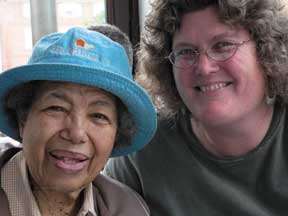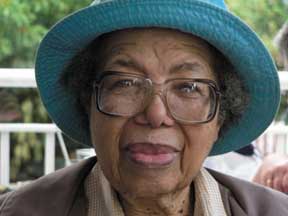 longed
believed that love, like charity, should begin at home.
longed
believed that love, like charity, should begin at home.| readings/appearances | books | poetry | about | audio/site map | submit | Tea Leaves: a memoir of mothers & daughters | links/contact | readings/appearances |

Click
here to read commentary on Anita Cornwell
Read an excerpt of Anita Cornwell's groundbreaking book,
Black Lesbian in White America
More work by Anita--site map
Anita Cornwell was in her
forties by the time second wave feminism arrived in the mid-1960s. She soon
became one of the few black lesbians in the United States who were living out,
speaking out, and writing out. Her pioneering book Black Lesbian in White
America published in 1983 by Naiad Press.
Highsmith,
A Romance of the 1950s
A Memoir by Marijane Meaker
Cleis Press, 2003
I knew before I ordered this volume from my favorite bargain books person that Patricia Highsmith had been quoted as saying she liked most men better than she did women, but not in bed.
That, of course, gave me
great pause. If a person didn't particularly like her own gender, how could
she love herself? Yes, I have  longed
believed that love, like charity, should begin at home.
longed
believed that love, like charity, should begin at home.
On the other hand, I do enjoy reading about writers, especially those who've managed to create quite a stir somewhere along the way. And Highsmith had done this with her Strangers On A Train, produced by Alfred Hitchcock in 1951. I never saw the movie, however, and did not read the book as I didn't think it was my cup of tea.
Marijane Meaker--quite a writer herself, having written over 50 books, some under her own name, others under Vin Packer, Ann Aldrich, and M.E. Kerr--met Highsmith one night during the mid 1950s at L's, "a dark, cozy lesbian bar" on a little side street in Greenwich Village.
Tall and thin with black shoulder-length hair and dark brown eyes, "she looked like a combination of Price Valiant and Rudolf Nureyev." The woman in L's knew Highsmith as Claire Morgan and revered her because of her novel, The Price of Salt, published in 1952 by Coward McCann.
One of the most important questions Highsmith asked Meaker that first night was whether she liked to travel, which was "a foreshadowing of things to come." Highsmith also liked to drink. "I was nowhere the drinker Pat was," Meaker wrote. "I was used to drinking a lot one night a weekend."
About a year after their first meeting, they signed a two-year lease for a large rambling house in Bucks County, Pennsylvania, where they barely knew more than three people. Meaker had promised Highsmith that if they didn't want to stay after the lease ended, they'd give Europe a try.
Their working schedules "meshed nicely," Meaker wrote. "I was an afternoon worker so...I ate lunch out. A morning person, Pat was usually finished with her day's stint, and a lunch ...by the time I got home...[and] would be gardening or making furniture just as I was climbing the stairs to my study."
But it was a hard winter, and because there "were few schools and main roads...no plow trucks came with any regularlity," so they were isolated 24 hours a day. Then one snowly night when they hadn't left the house in a few days, "Pat got a surprise call from a woman named Natica Waterbury. The call...started Pat on a long trip back, a trip fueld by alcohol, nostalgia for Paris, for other times, other places, and I think of it still as a beginning to losing something we had."
In fairness to Highsmith, Meaker tried to show Pat's side of their problem by quoting a mutal friend: "First, you're making her stay in this country when she hates it here, and second you're not facing the fact that Pat was always a big drinker." Then, the friend finally concluded, "Pat's right about one thing...you made her up. Then you nagged her for not being the person you made up."
Finally, they decided to live apart. Highsmith got an apartment in New Hope, and there was a great deal of travel back and forth, which, of course, did not solve anything. Then, one rainy night Meaker decided to pay Highsmith a suprise visit, and ran into a telephone pole, thanks to the fog rolling in over the hills.
As it turned out that happened to be the best move Meaker had made in months. The couple who rescued her--Burr and his wife August, better known as Gus--were in the right place at the right time. And Gus became the solution Meaker was searching for to free herself from Highsmith.
Highsmsith returned to her beloved Europe after she and Meaker separated, and twenty-seven years passed before Meaker heard from her again in October 1988. They corresponded for several years, then inthe autumn of 1992, Meaker wrote, "Pat went directly to New York for overnight then to Weatherford, Texas, for three days [to visit her family], and on to East Hampton to visit me for three more...a little drunk...carrying a gallon of Dewar's scotch."
Meaker soon learned that Highsmith was more than a little drunk, she was smashed. Worse still, perhaps, she still seemed to possess all, or nearly all, of the politically incorrect prejudices of her youth. She died in Switzerland in February, 1995.
The end
| author | books | poetry | about | audio/site map | submit | Tea Leaves: a memoir of mothers & daughters | links/contact | readings/appearances |